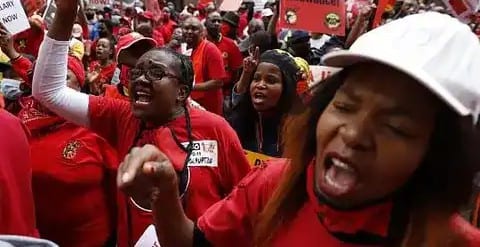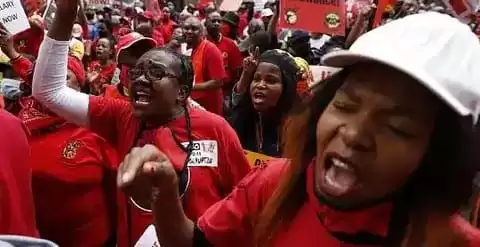

Last updated on September 11th, 2021 at 08:21 am
South Africa’s largest trade unions held nationwide marches on Wednesday to protest the high level of job destruction, the poor state of transport, corruption and the lack of measures to combat the deep crisis generated in Africa’s second largest economy by the pandemic.
The national strike hit key sectors such as transport, industry or education throughout the country, although there were no precise figures to show the extent of mobilisation.
In some cities, despite the fact that the call for this strike was simply to not go to work as a precaution against COVID-19, there were some rallies and protest marches.
“They are telling us that as workers we have to drown in poverty because the government cannot assist us,” Enca Neo Mashike, local leader of one of the public workers’ unions that was supporting the protest today, told South African television from a rally organized in front of the country’s largest hospital in Johannesburg.
Wednesday’s strike is being promoted by the Congress of South African Trade Unions (COSATU) and the South African Federation of Trade Unions (SAFTU), the two main labor centers in the country.
Together, the two unions are estimated to have nearly 3 million members.
“What we are raising is that corruption here has taken away from workers. Healthcare workers, workers in the public sector, have died contracting coronavirus because the quality of PPEs that we were given were not of a quality that will defend workers as they are trying to defend our own lives”, said Zingiswa Losi, president of the Congress of South African Trade Unions (COSATU).
According to data from the official South African statistics institute, during the quarter in which South Africa applied a hard lockdown to curb the COVID-19 pandemic, the gross domestic product (GDP) of Africa’s most developed economy plummeted by 51%.
Anti-coronavirus measures virtually paralyzed the country from late March to early June (with only minor easing in May), when activity slowly began to resume.
In that period alone, it is estimated that some 2.2 million jobs were destroyed.
South Africa, however, had already been in recession since 2019 and with exaggerated levels of unemployment of around 30%, which had been stagnant for years.
The South African government projects that for this year the economy will contract by at least 7.2%, leaving the biggest crisis in almost a century, but the prediction could even be too optimistic in view of the data already known.
(AFP)
The South African Social Security Agency (SASSA) informs its beneficiaries that Workers' Day on May 1st will push the May…
A team from the West African group ECOWAS (Economic Community of West African States) has left Guinea-Bissau after the country’s…
MultiChoice and NBCUniversal have given $145 million to support Showmax Africa. This money will help with running the business and…
The ongoing search for Free State police officers in Centurion resulted in the discovery of five dead bodies found in…
The Sistine Chapel will welcome Cardinal members in the forthcoming week to start electing succession candidates on May 7 for…
Namibia’s President, Netumbo Nandi-Ndaitwah, has removed Agriculture Minister Mac-Albert Hengari from his position. The decision came after serious allegations of…
This website uses cookies.